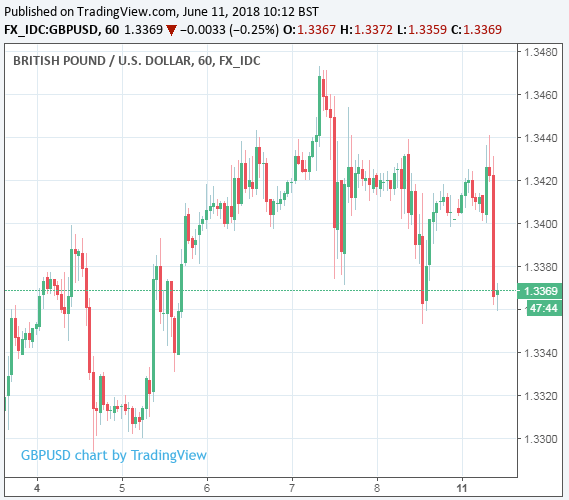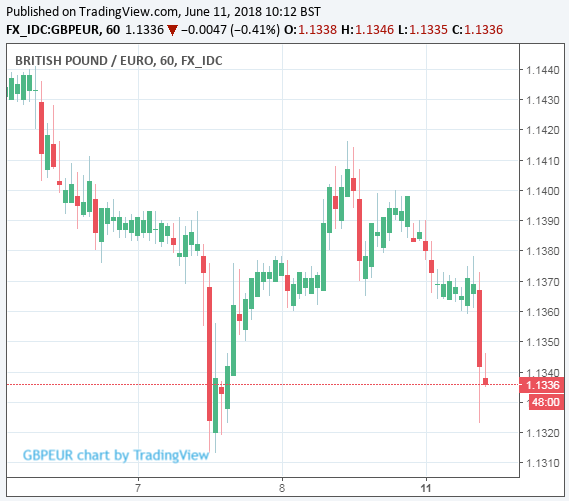British Pound Slides after UK Manufacturing, Industrial Data Miss the Spot for April
- Written by: James Skinner
-GBP reverses course and slumps after weak April industrial data.
-Manufacturing, construction, industrial production all lower in April.
-Data and Brexit politics in focus as White House twists knife on trade.

© freepeoplea, Adobe Stock
Pound Sterling slid lower Monday after Office for National Statistics data showed UK manufacturing production contracting for the second consecutive month in April and the UK's goods trade balance widening much faster than was expected, marking a poor start to the second-quarter for UK industry.
The industrial numbers come at the beginning of an action-packed week for Pound Sterling, with the latest UK labour market and inflation figures due Tuesday and Wednesday, while Prime Minister Theresa May will face a series of key Brexit-related votes in parliament.
Output from the UK manufacturing sector fell by -1.4% during April, deepening the -0.1% contraction seen in March, when economists had been looking for a 0.3% increase. This is the second consecutive contraction and third straight decline for output from the sector.
"The surprise fall in industrial production in April suggests that the sector is still struggling to pick up pace after a weak Q1. Manufacturing output contracted by 1.4% on the month, the third consecutive decline, leaving the quarterly growth rate at minus 0.5%," says Andrew Wishart, an economist at Capital Economics.
Markets care about the data because manufacturing is Britain's third largest economic sector and so production numbers here can have an impact on overall expectations for GDP growth.
Meanwhile the beleaguered construction sector saw output rise by a meagre 0.5% which, although drawing a line under the -2.3% fall seen in March, was disappointing because economists had looked for a much larger 2.4% increase.
"Having fallen by almost 3% in Q1 (and knocking 0.2pps off quarterly GDP growth), output rose by 0.5% in April, suggesting that the sector is starting to turn a corner," Wishart adds.
The construction industry fell into recession in 2017 and was a notable contributor to the sharp slowdown in UK growth during the first quarter so the partial rebound may still come as welcome relief for some.
"Overall, then, the early hard data reveal that Q2 got off to a soft start. However, the industrial sector only account for 14% of the economy. And the surveys suggest that a pickup in manufacturing and export growth is in store," Wishart concludes.
These poor numbers meant overall industrial production fell by -0.8% at the start of the second quarter when markets had been looking for a 0.1% rise.
"April’s production and construction data cast considerable doubt over whether quarter-on-quarter GDP growth will rebound in Q2 and meet the MPC’s 0.4% forecast," says Samuel Tombs, chief UK economist at Pantheon Macroeconomics. "If output in both sectors hold steady in May and June, they will collectively subtract 0.20pp from quarter-on-quarter GDP growth."
Separately, the UK's goods trade balance was shown widening to -£14 billion during the month, from -£12 billion in March, when economists had hoped it would narrow to -£11.5 billion. The ONS attributes the wider deficit to sharp falls in aircraft, pharmaceuticals and machinery exports.
Markets care about the trade data because it provides insight into real world demand for Pound Sterling, as well as an early steer on the likely pace of economic growth in a given period.

Above: Pound-to-Dollar rate shown at hourly intervals.
The Pound was quoted 0.15% lower at 1.3366 against the Dollar following the release, after reversing an earlier 0.29% gain, while the Pound-to-Euro rate extended losses to trade 0.50% lower at 1.1326. Sterling was lower against almost all other developed world currencies after having reversed earlier gains.

Above: Pound-to-Euro rate shown at hourly intervals.
Manufacturing has been a relative bright spot for the UK economy ever since the Brexit vote of June 2016, with the double digit fall in the Pound making British goods cheaper for overseas customers to buy, while a robust domestic economy has also fuelled demand.
This saw industrial firms experience eight consecutive quarters of output growth in the period to the end of 2017, marking the longest expansion for the sector since 1988, although momentum has waned recently. The latest slide in activity could be seen as vindicating the Bank of England for its decision not to raise interest rates in May.
"An unexpected decline in production, combined with a sharp widening in the trade balance, suggests the economy may not be rebounding quite as fast as the Bank of England hopes," says James Smith, a developed markets economist at ING Group.
Advertisement
Get up to 5% more foreign exchange by using a specialist provider to get closer to the real market rate and avoid the gaping spreads charged by your bank when providing currency. Learn more here
GBP: Brexit-wrecking Amendments in Focus
Monday's price action comes at the beginning of an important week for the Pound and UK economy. UK Prime Minister Theresa May faces a series of votes in the House of Commons on Tuesday 12, June on whether to approve 15 “Brexit wrecking” amendments inserted into the EU Withdrawal Bill by the House of Lords.
"We expect a fairly neutral GBP trading today ahead of the tomorrow’s UK Parliament vote on amendments of the EU withdrawal bill. There is a chance the government loses one of the key votes, such that parliament, after all, does have a chance for a ‘meaningful’ say in the final Brexit deal. This would lessen the chances of a hard Brexit and could again help sterling," says Petr Krpata, chief EMEA foreign exchange strategist at ING Group.
If the Prime Minister loses the votes, which some reports have suggested she might, then the UK will be required by law to remain a member of the EU single market and customs union and the House of Commons will have the power to send government back to the negotiating table if MPs are not happy with the final arrangements negotiated by Theresa May.
Such an outcome could reduce the prospect of a so called hard Brexit, where the UK leaves the EU in March 2019 without any arrangements for future trade in place, but may also dramatically raise the prospect of a challenge to PM May’s leadership.
That latter consequence would heighten the risk of another general election being called and, according to some, raise the prospect of a Labour Party government which poses a "severely" negative development for Pound Sterling.
World Gets Trumped: Trade War Turning Hot?
The manufacturing and trade numbers also come as markets grapple with the fallout from the latest White House salvos on international trade.
The Dollar has fallen since Markets awoke Monday due to fears over a step-up in President Donald Trump's apparent aggressive push to erase the US international trade deficit.
Sorry, we cannot let our friends, or enemies, take advantage of us on Trade anymore. We must put the American worker first!
— Donald J. Trump (@realDonaldTrump) 11 June 2018
....Germany pays 1% (slowly) of GDP towards NATO, while we pay 4% of a MUCH larger GDP. Does anybody believe that makes sense? We protect Europe (which is good) at great financial loss, and then get unfairly clobbered on Trade. Change is coming!
— Donald J. Trump (@realDonaldTrump) 11 June 2018
Fair Trade is now to be called Fool Trade if it is not Reciprocal. According to a Canada release, they make almost 100 Billion Dollars in Trade with U.S. (guess they were bragging and got caught!). Minimum is 17B. Tax Dairy from us at 270%. Then Justin acts hurt when called out!
— Donald J. Trump (@realDonaldTrump) 11 June 2018
Advertisement
Get up to 5% more foreign exchange by using a specialist provider to get closer to the real market rate and avoid the gaping spreads charged by your bank when providing currency. Learn more here




